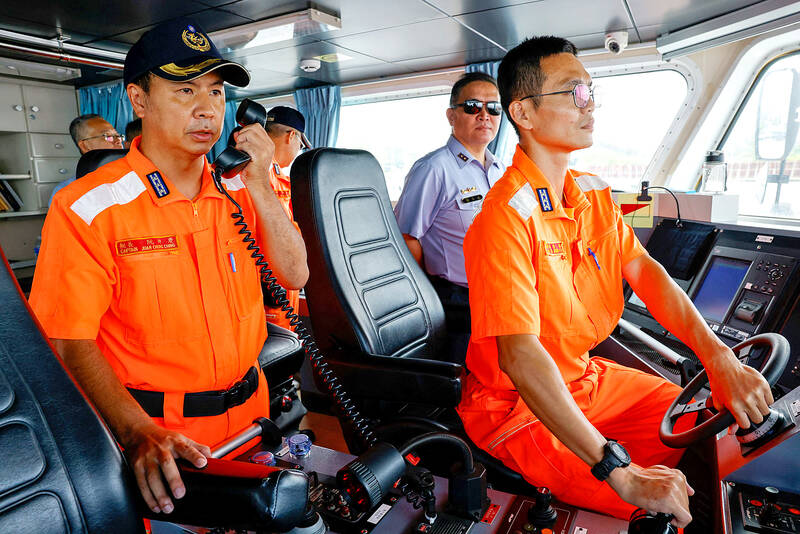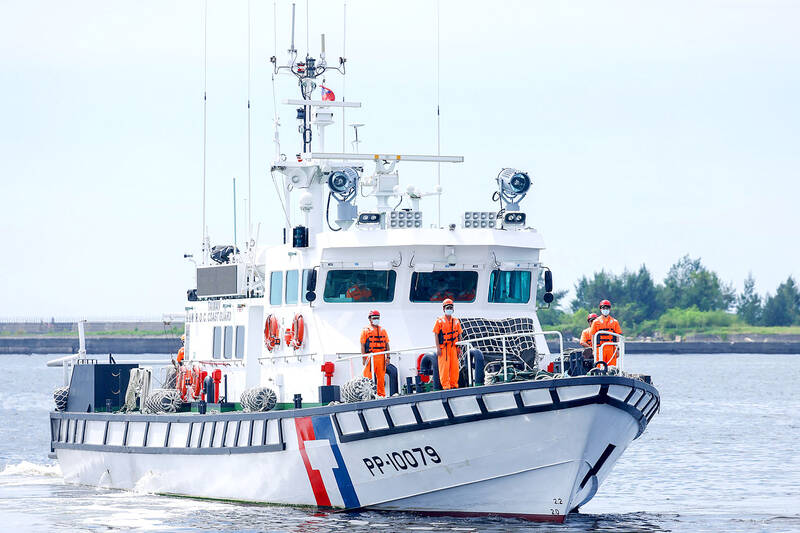Taiwanese coast guard captain Juan Chung-ching’s (阮俊慶) patrol boat moves across the Taiwan Strait, scanning for threats to what Taipei said is the newest target of China’s “gray zone” warfare: undersea cables vital to the nation’s communications.
Juan steered his 100-tonne vessel, armed with water cannons and an autocannon, toward TP3, the undersea cable that made international headlines this year when a Chinese captain was found guilty of deliberately severing it.
TP3 is one of 24 undersea cables connecting Taiwan to the domestic or global Internet.

Photo: Ann Wang, Reuters
Such missions have become a top priority to combat China’s “gray zone” warfare, a tactic to drain Taiwan’s resources while falling short of an act of war, Juan said.
On Aug. 28, Reuters became the first news media outlet to join one of these patrols.
“Their incursions have severely undermined the peace and stability of Taiwanese society,” Juan said, whose boat escorted the Chinese-crewed Hong Tai 58 (鴻泰58號) for investigation hours after TP3 went offline in February.

Photo: Ann Wang, Reuters
“We are stepping up patrols in this area, monitoring for any vessels engaging in disruptive or destructive activities,” he said.
Taiwanese authorities have connected two incidents of suspected underwater sabotage with China-linked boats this year, including one in Taiwan’s north.
China’s Taiwan Affairs Office has said that Taiwan was “manipulating” possible Chinese involvement in the severing of undersea cables and making up accusations before the facts were clear.
Taiwan’s stepped-up response comes with the Baltic Sea region on high alert after a string of suspected underwater sabotage incidents since Russia invaded Ukraine in 2022.
In the waters near TP3, coast guard vessels are now conducting 24-hour patrols.
An alert system detects vessels that come within a 1km range off TP3 at slow speed, while dozens of operators at radar stations work to identify suspicious ships, the coast guard said.
Radio warnings are issued to those boats before coast guard vessels are dispatched to warn them away.
“Taiwan ranks among the top countries facing this issue,” National Security Council Deputy Secretary-General Lin Fei-fan (林飛帆) said. “We are indeed very close to China and many densely populated submarine cable areas are highly vulnerable to damage.”
The task has stretched coast guard resources. Their eight boats and nearly 500 officers in the area are also responsible for life-saving missions and enforcing maritime law.
High on their watch list are 96 China-linked boats blacklisted by Taiwan. Many carry flags of convenience registered to third countries to avoid taxes and regulations.
Taiwan is also monitoring nearly 400 other China-linked boats, including cargo ships that could be converted into war vehicles, a senior Taiwanese security official briefed on the matter said.
Taipei and other “like-minded” capitals are sharing intelligence on the real-time locations of these boats, the official said.
“Those ships are like cannon fodder, piles of scrap metal,” said Jenson Chien, commander of a coast guard flotilla near TP3, pointing to several dilapidated Chinese boats.
“They employ minimal resources to disrupt and sever our connections, sowing unrest throughout Taiwanese society,” he said.

SHIPS, TRAINS AND AUTOMOBILES: The ministry has announced changes to varied transportation industries taking effect soon, with a number of effects for passengers Beginning next month, the post office is canceling signature upon delivery and written inquiry services for international registered small packets in accordance with the new policy of the Universal Postal Union, the Ministry of Transportation and Communications said yesterday. The new policy does not apply to packets that are to be delivered to China, the ministry said. Senders of international registered small packets would receive a NT$10 rebate on postage if the packets are sent from Jan. 1 to March 31, it added. The ministry said that three other policies are also scheduled to take effect next month. International cruise ship operators

NUMBERS IMBALANCE: More than 4 million Taiwanese have visited China this year, while only about half a million Chinese have visited here Beijing has yet to respond to Taiwan’s requests for negotiation over matters related to the recovery of cross-strait tourism, the Tourism Administration said yesterday. Taiwan’s tourism authority issued the statement after Chinese-language daily the China Times reported yesterday that the government’s policy of banning group tours to China does not stop Taiwanese from visiting the country. As of October, more than 4.2 million had traveled to China this year, exceeding last year. Beijing estimated the number of Taiwanese tourists in China could reach 4.5 million this year. By contrast, only 500,000 Chinese tourists are expected in Taiwan, the report said. The report

The Forestry and Nature Conservation Agency yesterday launched a gift box to market honey “certified by a Formosan black bear” in appreciation of a beekeeper’s amicable interaction with a honey-thieving bear. Beekeeper Chih Ming-chen (池明鎮) in January inspected his bee farm in Hualien County’s Jhuosi Township (卓溪) and found that more than 20 beehives had been destroyed and many hives were eaten, with bear droppings and paw prints near the destroyed hives, the agency said. Chih returned to the farm to move the remaining beehives away that evening when he encountered a Formosan black bear only 20m away, the agency said. The bear

HORROR STORIES: One victim recounted not realizing they had been stabbed and seeing people bleeding, while another recalled breaking down in tears after fleeing A man on Friday died after he tried to fight the knife-wielding suspect who went on a stabbing spree near two of Taipei’s busiest metro stations, Taipei Mayor Chiang Wan-an (蔣萬安) said. The 57-year-old man, identified by his family name, Yu (余), encountered the suspect at Exit M7 of Taipei Main Station and immediately tried to stop him, but was fatally wounded and later died, Chiang said, calling the incident “heartbreaking.” Yu’s family would receive at least NT$5 million (US$158,584) in compensation through the Taipei Rapid Transit Corp’s (TRTC) insurance coverage, he said after convening an emergency security response meeting yesterday morning. National